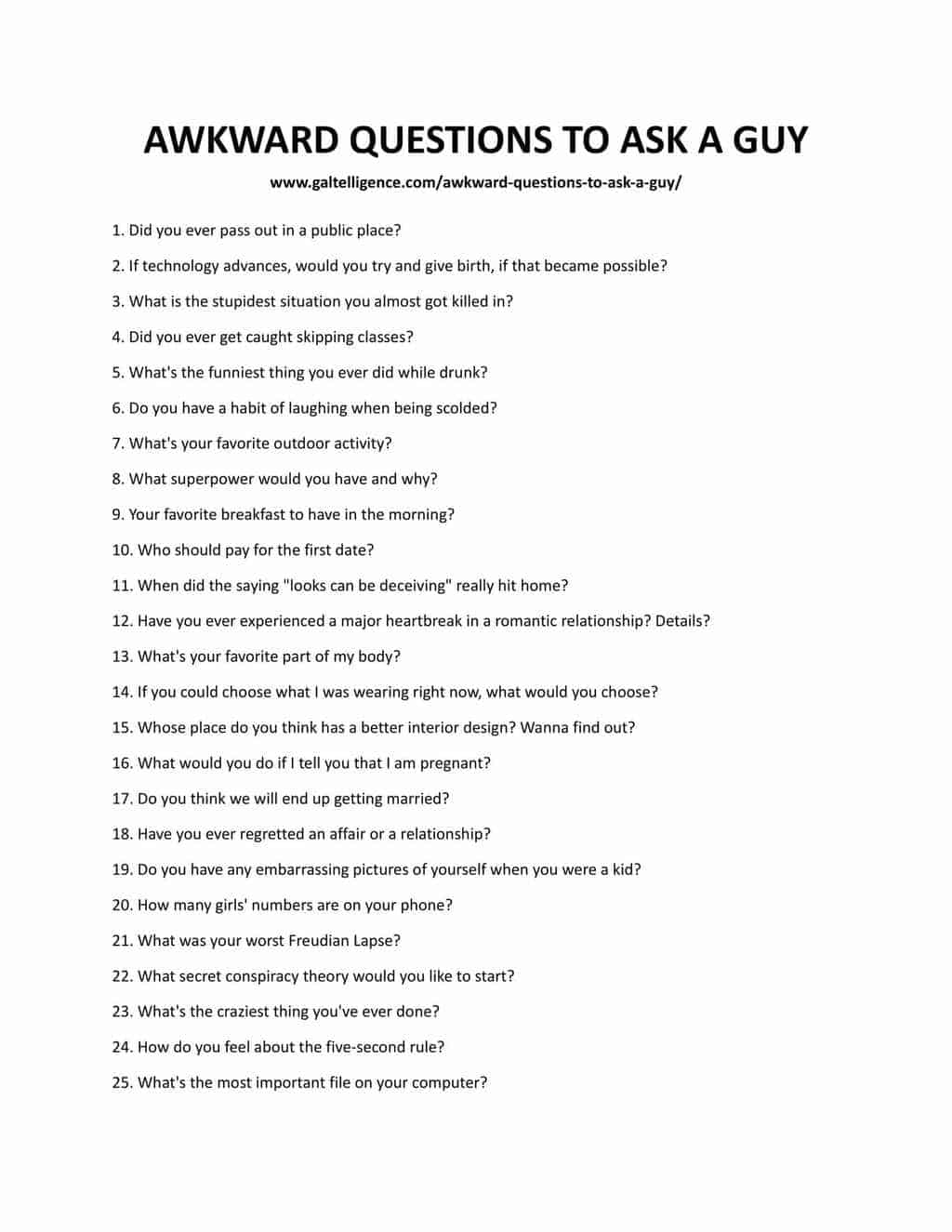Exploring The Art Of Awkward Questions
In a world filled with social interactions, awkward questions often arise, leaving us feeling uneasy or uncertain about how to respond. Whether posed during casual conversations or formal interviews, these questions can catch us off guard and lead to moments of discomfort. However, they also have the potential to spark intriguing discussions and reveal deeper insights into our thoughts and feelings. The beauty of awkward questions lies in their ability to challenge our comfort zones and encourage us to embrace vulnerability.
Awkward questions may stem from curiosity, personal experiences, or even cultural differences. They can range from the innocuous to the deeply personal, often blurring the lines between humor and seriousness. As we navigate through various social dynamics, understanding how to handle awkward questions can enhance our communication skills and strengthen our connections with others. In this article, we will delve into the realm of awkward questions, exploring their impact on our interactions and providing guidance on how to respond effectively.
So, what exactly are awkward questions, and how do they affect our daily lives? It's essential to recognize that these questions can arise in different contexts, such as friendships, workplaces, or family gatherings. By examining the nature of awkward questions and offering strategies to tackle them, we can turn potentially uncomfortable situations into opportunities for growth and understanding.
What Are Awkward Questions?
Awkward questions are those that create discomfort or tension in a conversation. They can come from a lack of social awareness, curiosity about sensitive topics, or even intentional provocation. These questions often leave the recipient in a position where they must navigate their feelings and decide how to respond. Some common examples of awkward questions include:
- “Why are you still single?”
- “What’s your biggest fear?”
- “How much do you earn?”
- “Have you ever cheated on someone?”
While these questions can be intrusive, they also provide an opportunity for candor and honesty. When approached with care, awkward questions can lead to meaningful conversations and deeper connections.
Why Do People Ask Awkward Questions?
Understanding the motivations behind awkward questions can help us navigate them more effectively. Here are some reasons why people might ask these types of questions:
- Lebron James Bold
- Iconic 1970s
- Did Cameron Boyce Have A Sister
- Caitlin Clark Dual Citizenship Canada
- New Movie Sam Elliott
- Cultural differences: What is considered an appropriate question in one culture may be seen as intrusive in another.
- Curiosity: People may be genuinely interested in the lives of others and ask questions without considering their potential awkwardness.
- Social dynamics: In some cases, individuals may ask awkward questions to test boundaries or gauge someone's comfort level.
How Can You Respond to Awkward Questions?
Responding to awkward questions can be challenging, but with the right approach, you can navigate these situations gracefully. Here are some strategies to consider:
- Stay calm: Take a deep breath and maintain your composure.
- Deflect with humor: Lightening the mood with a joke can ease tension.
- Be honest: If you're comfortable, provide a candid response.
- Change the subject: Politely steer the conversation in a different direction if the question feels too invasive.
Who is Most Likely to Ask Awkward Questions?
Awkward questions can come from anyone, but certain personalities may be more prone to asking them. Here are a few types of individuals who might frequently pose awkward questions:
- The Inquisitive Friend: Often well-meaning but lacking social cues, they may ask personal questions out of curiosity.
- The Family Member: Relatives might feel entitled to inquire about your life choices, leading to potentially uncomfortable situations.
- The Coworker: In a professional setting, a colleague may inadvertently cross boundaries with personal questions.
Can Awkward Questions Be Beneficial?
While awkward questions can create discomfort, they also have the potential to foster growth and understanding. Here are some benefits of engaging with awkward questions:
- Encouraging vulnerability: Sharing personal experiences can deepen connections with others.
- Challenging perspectives: Awkward questions can lead to discussions that prompt self-reflection and growth.
- Breaking down barriers: These questions can help dismantle social norms and encourage open dialogue.
How to Create a Safe Space for Awkward Questions?
Creating an environment where awkward questions can be asked and addressed openly is essential for healthy communication. Here are some tips for fostering a safe space:
- Practice active listening: Show genuine interest in the speaker's thoughts and feelings.
- Encourage honesty: Let others know that it's okay to ask difficult questions.
- Be respectful: Maintain a respectful tone and approach sensitive topics with care.
- Share your experiences: Leading by example encourages others to be open and honest.
What Are Some Common Awkward Questions People Encounter?
Awkward questions can vary widely based on context and personal relationships. However, some recurring themes often arise. Here are a few common awkward questions people encounter:
- “Are you still working at that dead-end job?”
- “Why don’t you have kids yet?”
- “Have you ever been in therapy?”
- “What do you think of my new haircut?”
These questions can provoke a range of responses, from laughter to introspection. The key is to approach them with an open mind and a willingness to engage in meaningful dialogue.
How Can You Prepare for Awkward Questions?
Preparation can go a long way in helping you navigate awkward questions with confidence. Here are some strategies to consider:
- Anticipate potential questions: Think about what might come up in various social situations.
- Practice your responses: Rehearse answers for questions you find particularly challenging.
- Know your boundaries: Decide in advance what topics you are comfortable discussing.
Can Awkward Questions Lead to Stronger Relationships?
Ultimately, the way we handle awkward questions can shape our relationships. By embracing vulnerability and engaging in open conversations, we can create deeper connections with others. When we share our experiences, fears, and thoughts, we invite others to do the same, fostering a sense of trust and understanding.
Conclusion: Embracing Awkward Questions
In conclusion, awkward questions are a natural part of social interactions. While they can lead to moments of discomfort, they also provide opportunities for growth, understanding, and deeper connections. By learning how to navigate these questions with grace and openness, we can turn potentially awkward situations into meaningful conversations that enrich our relationships and broaden our perspectives.
Article Recommendations
- Lisa Marie Presley With Twins
- Iconic 1970s
- East Village San Diego Bars
- Mikayla Campinos Por
- J D Vance Couch Meme



Detail Author:
- Name : Prof. Kira Senger V
- Username : yost.mollie
- Email : kilback.freeda@aufderhar.org
- Birthdate : 1993-05-04
- Address : 4847 Clarabelle Plain Lake Americoberg, ID 03149
- Phone : 272.560.6737
- Company : Dare-Runolfsdottir
- Job : Bookkeeper
- Bio : Dolor aliquid vero quas suscipit. Voluptates autem necessitatibus debitis aut at repellat facere dolore. Consequatur molestias rerum cumque ut. Ipsa fuga adipisci pariatur.
Socials
linkedin:
- url : https://linkedin.com/in/idell_hayes
- username : idell_hayes
- bio : Deserunt a minus repellendus ad natus rem.
- followers : 499
- following : 639
tiktok:
- url : https://tiktok.com/@ihayes
- username : ihayes
- bio : Et et numquam mollitia amet possimus.
- followers : 3610
- following : 2723
instagram:
- url : https://instagram.com/hayesi
- username : hayesi
- bio : Eius cumque esse quisquam voluptates. Aut cumque temporibus et et iste.
- followers : 621
- following : 610
twitter:
- url : https://twitter.com/ihayes
- username : ihayes
- bio : Reprehenderit dolores officiis delectus voluptate assumenda omnis nihil. Laudantium atque repudiandae repellat tempora architecto sint aspernatur.
- followers : 1465
- following : 1130
facebook:
- url : https://facebook.com/idellhayes
- username : idellhayes
- bio : Quia qui impedit debitis est voluptas.
- followers : 6772
- following : 1946